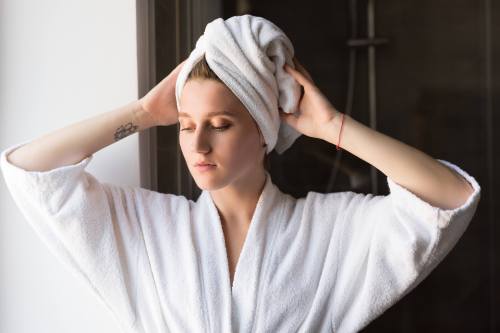Knowing whether you have hard or soft water is super important for skin—here’s why
A pro reveals why it matters whether you cleanse with hard vs soft water for skin and how you can make your routine work harder by knowing the difference.

When it comes to locking down a skin-care regimen, there are plenty of things to take into consideration: the environment, one’s skin type, and, as it turns out, the type of water running through the faucet. The question of hard versus soft water for skin isn’t one that we get to talk about often, but in actuality, it makes a big difference in how all products work, what products you need, and even certain skin conditions that might start to creep up as a result.
Here’s why: Water can contain certain metals like copper, calcium, and magnesium that build up and act like free radicals when they hit your complexion. That means that despite best-laid plans to fend off or fight free radicals from things like pollution out in the world, by simply having a skin-care routine and sticking to it, you could be introducing problems onto your complexion. And if that’s not the most depressing thing I’ve told you all day, then I’m not sure what is.
So, onto the good news: By knowing what type of water you have and adjusting and safeguarding your routine, you can supercharge your skin care and make it work even harder for you. More on that is just a scroll away.

Hard versus soft water for skin
“Hard water is caused by calcium and magnesium buildup as well as other hard metal buildup in the water, and that causes damage to the skin because they’re metals,” says Ming Zhao, co-founder and CEO of Proven skin care which uses artificial intelligence to customize your skin routine. “This dries out the skin and causes it to lose luster, and has bad long-term effects on your complexion.” In technical terms, “minerals deposit on the skin, disrupt proper function of the outer skin layer, and lead to irritation and inflammation,” explains Joshua Zeichner, MD, a New York-based dermatologist.
This Parisian Skincare Brand Is Launching in the United States for the First Time—Here’s What a Derm Wants You to Know

We’re Calling It: Cleansing Balms Are the Face Wash of the Future—Here Are 3 to Add to Your Cart

This Is the One Product That Scarlett Johansson Always Keeps in Her Purse and on Her Bedside Table

And once they’re on skin, they can exacerbate chronic inflammatory conditions by, well, inflaming things further. “This may be particularly worrisome if you suffer from dry skin or conditions like eczema.” Hard water, in short comprises the barrier, preventing all of the skin’s well-oiled systems from working harder for you and leaving it vulnerable. Need a visual? Think of haircare: When hard water is used, hair color molecules can oxidize more quickly, turning brassy or otherwise drying out. The same thing happens to skin, and while you can’t see the dramatic results from the start, they’re still building up over time.
If you have soft water, on the other hand, this just means it has low concentrations of calcium and magnesium ions—it has the minerals removed except for sodium, according to Zeichner. “It’s a lot less drying to your skin than hard water,” says Zhao. “The thing is, when you bathe with soft water, it can leave your skin with a slippery feeling. People tend to mistake this for leftover soap residue and react by over-washing their skin.” And as you can imagine, this also results in dryness, so opt for a gentler cleanser such as the Dove Sensitive Skin Shower Foam ($6). Not only does it contain the same moisturizing benefits as the beauty bar, it’s also super lightweight and easy-to-detect once it’s washed away.
The hard water skin-care kit
This is all not to say you have to cower in fear of the water that comes out of your shower head or bathroom sink—there are plenty of ways to combat the effects of metals in H2O. First up? You can purchase a special shower head such as the Raindrops Beautifying Shower Filter ($120). “You can actually purchase a specialized shower head to soften the water that you bathe with,” says Dr. Zeichner. Just make sure that the one you buy specifies that it will remove mineral buildup rather than simply removing impurities.
“There’s no real reason why you would want [hard water over soft water] or the other, but if you choose to use soft water, this removes both calcium bicarbonate and magnesium,” says Victoria Fu, a cosmetic chemist from Chemist Confessions. “It is worth noting that calcium and magnesium are used in personal care products—usually in the form of gluconate or carbonate salts—and can have benefits for the formula.”
So, needless to say: The skin-care products that you use can also help. Like with haircare, there are certain chelators that unbind mineral buildup from skin in the same way they do from strands. “There are two families of ingredients that help combat water hardness,” says Zhao. “One is citrus ingredients, because they’re rich in citric acid, which helps to neutralize hard water on a micro level. This reduces the drying effects of hard water so you can achieve softer, more moisturized skin.” You can spot citric acid in many cleansers, such as the Drunk Elephant Beste Jelly Cleanser ($34), which helps to solve the problem right at the get-go. Alternatively, Dr. Dennis Gross Hydra-Pure Intense Moisture Cream has a chelating complex that can help rid mineral build-up from skin.
Zhao also proposes that you can look to fermented ingredients to help. “The fermentation process and the probiotics that come with it combat the hardness of water,” Zhao explains. “The fermentation process brings out the key efficacy of the other skin-care ingredients much more.” Though Fu hasn’t seen any data to uphold this theory, it’s always beneficial to pack on good-for your skin warriors with probiotics such as the Mother Dirt Moisturizer ($25).
Not sure what type of water you’re dealing with? The easiest way to tell is if you have mineral buildup on faucets and other water fixtures, or soap scum on your bathroom surfaces—Zhao says this indicates hard water. “You can also spot signs of hard water beyond the bathroom, including hazy spots on your glassware and dishes. It can even affect your clothes, causing them to feel dull and scratchy after washing,” she says.
Either way, with a special shower head and a well-rounded beauty routine, the only metal you’ll have to worry about is that which is being blasted from your neighbor’s apartment at 2 a.m.
Also, here’s why you should choose a water-based moisturizer for healthier skin. And this is the reason why you shouldn’t exfoliate flaky skin (yes, really).
Sign Up for Our Daily Newsletter
Get all the latest in wellness, trends, food, fitness, beauty, and more delivered right to your inbox.
Got it, you've been added to our email list.







